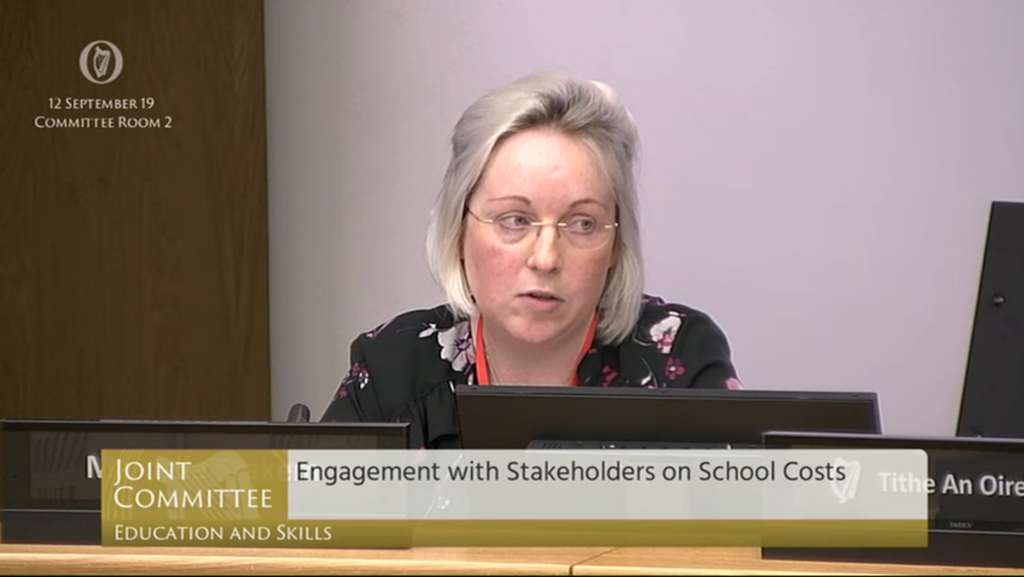
SVP Opening Statement to the Joint Oireachtas Committee on Education and Skills 12 Sept. 2019
Introduction
The Society of St. Vincent De Paul (SVP) welcomes the opportunity to make a presentation to this committee. SVP see access to education as a critical enabler out of social exclusion and poverty.
In the week before our schools reopened, the Society of Saint Vincent De Paul (SVP) took approximately 250-300 calls per day from worried parents relating to back to school costs.
Calls for help to the society from families struggling with the cost of education increased by 4% this summer. This increase comes after we reported a 20% jump in requests for help with school costs in 2018. This is the third year in a row where SVP have seen an increase in calls for back to school help.
The following case study highlights the impact school costs have on parents, children and young people;
"My daughter is starting secondary school in September and the cost is over €1,000 as she needs an ipad. I don’t know how I am going to meet this cost as I am really struggling. I don’t want her to feel different when she starts secondary school as she was bullied in the past." (Lone Parent 2018).
SVP Recommendations:
SVP are proposing a number of actions that would reduce the costs of primary and secondary education:
Make schools books free across all non -fee paying primary and secondary schools. Begin with a €20 million investment in Budget 2020 to provide free books to all primary school children.
End the voluntary contribution system in all non-fee paying primary and secondary schools. Begin by restoring the capitation grant rate to 2010 levels in Budget 2020.
Over the medium term we are requesting that the Department carry out an independent assessment of the adequacy of the capitation rate to schools and incrementally increase funding so that all children have access to quality, free primary and secondary education.
In more recent times, our members have noted an increase in requests from parents where the use and purchase of digital devices is mandatory. In most cases there is no financial support in place to help parents meet the costs of equipment and software which can be between €500 and €800.
SVP recommends that the Department of Education and Skills establish a working group to examine the use of digital devices in schools taking into account the cost impact on parents. In addition, engagement with companies involved in providing digital devices and e-books should be initiated to explore additional cost-saving measures.
SVP published a research report last year titled ‘Stories of Struggle’. It highlights the reality experienced by households with children, whose income falls below that required for a Minimum Essential Standard of Living (MESL). In SVP member’s experience and detailed in the research, the families we assist are aware of the high cost nature of a loan from a moneylender, but due to a lack of accessible alternatives and the high cost of education they feel it is necessary to borrow from a moneylender. SVP recommends that the Department of Education and Skills adequately invest in our education system so that parents are not faced with the prospect of having to resort to moneylenders to fund their child’s education.
Conclusion
The underinvestment in our education system at both primary and secondary level is directly impacting the most vulnerable in society. If children and young people do not have the materials they need to learn, if they do not have access to school books, able to participate in curriculum activities, access to digital devices etc., they cannot be expected to excel or enjoy educational opportunities. This really influences their experience of school and hinders their future. As a result, it is imperative that long term measures are taken now to ensure that the current and future cohorts of students can participate in school on an equal footing and secure equal educational outcomes regardless of their parents’ economic status.
Annex
Delivering Free, Inclusive, Primary & Secondary Education: Recommendations:
- End the voluntary contribution system in all non-fee paying primary and secondary schools. Begin by restoring capitation rates to 2010 levels in Budget 2020. Estimated cost of restoring capitation rates to 2010 levels: €30 million. Commission an independent assessment on the adequacy of the capitation rates and incrementally increase funding so that all schools have sufficient funds to cover running costs.
- Increase funding for the School Book Grant Scheme by €20 million in Budget 2020. Implement the recommendation from the Joint Committee on Education and Social Protection (2013) to introduce a five-year template for the delivery of an entirely free school book scheme. Estimated Cost: €40 million.
- Equalise the income thresholds for the Back to School Clothing and Footwear Allowance (BTSCFA) for one and two parent families. Currently, the thresholds for one parent families are lower which makes it harder for these families to qualify for the payment.
- Restore child benefit to those aged 18 and over and in full-time level education in recognition of the higher education costs faced by families with older children. Estimated cost: €65 million.
- Commission a cost-benefit analysis of providing a hot school meals programme in all primary and secondary schools.
- Increase funding for the School Completion Programme to 2008 levels. Estimated cost: €8.2 million

